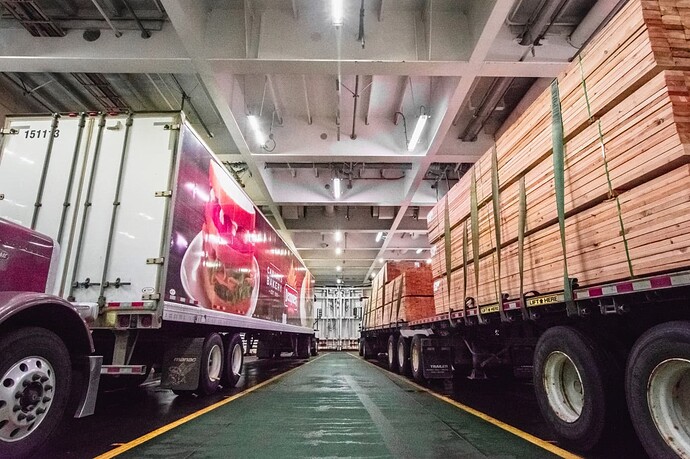In a joint letter to Congress, the Chicago-based American Institute of Steel Construction (AISC) has joined the American Iron and Steel Institute (AISI) and Steel Manufacturers Association (SMA), both based in Washington, in outlining their firm opposition to the proposed Mass Timber Federal Buildings Act, or S4149, and are urging members of Congress to reject a bill they say is “anti-competitive.”
The bill was introduced by Sens. Jeff Merkley of Oregon and James Risch of Idaho on April 17 and is designed to promote the use of mass timber in federal building projects and military construction. In a news release announcing the proposed legislation, Risch notes the mass timber industry is important to Idaho, Oregon and the entire Pacific Northwest’s economy and environment and builds on the opportunity presented by mass timber products to create jobs in rural and urban communities, reduce wildfire risk and increase forest resiliency.
“Mass timber from right here in Oregon is already a key piece of the puzzle to solving our nation’s affordable housing crisis and tackling climate chaos,” Merkley says. “Oregon is already leading the way on mass timber and is set to get an additional boost thanks to Oregon State University’s recent Mass Timber Tech Hub designation made possible by the CHIPS and Science Act—but we can do more. My Mass Timber Federal Buildings Act will ensure we’re building federal projects using mass timber products, helping to tackle our nation’s biggest challenges while creating good-paying jobs right here in Oregon and across the United States.”
The legislation would create an incentive for the use of mass timber building materials by providing a preference in federal building contracts for mass timber products, giving mass timber companies the ability to compete for federal construction, renovation or acquisition of public buildings and for military construction.
Additionally, the bill creates a two-tier contracting preference for mass timber. The first-tier preference applies to mass timber made within the U.S. and responsibly sourced from state, federal, private and tribal forestlands. The second tier, according to the bill, is optional and applies to mass timber products sourced from restoration practices, fire mitigation projects and/or underserved forest owners.
The bill also contains a reporting requirement for a whole building life cycle assessment, where the results will provide additional evidence of the carbon sequestration benefits of mass timber buildings. The bill is endorsed by organizations that include the American Wood Council, Sustainable Northwest, American Forest Resource Council, Forest Landowners Association and more.
“It’s abundantly clear that mass timber and wood construction are right-now climate solutions that also support and grow our rural communities,” says Jackson Morrill, president and CEO of the Leesburg, Virginia-based American Wood Council. “The Mass Timber Federal Buildings Act marks a significant step toward ensuring that the federal government—our nation’s single biggest developer—utilizes these products to reduce the significant carbon emissions from the built environment in this country. The United States is the global leader when it comes to managing our forests and the ecosystems, wildlife and communities that depend on them. This language will ensure that these emerging markets are supported by American manufacturing and sustainably source American wood products.”
In its letter to Congress, the steel organizations say the “favorable treatment” given to the mass timber industry would come at the expense of other building material competitors, including steel. The letter, addressed to Reps. Rick Crawford of Arkansas and Frank Mrvan of Indiana, raises concerns about the potential ramifications of this legislation on fair competition, taxpayer value and sustainability practices within the construction sector. Crawford and Mrvan are the chairman and vice chairman of the Congressional Steel Caucus, respectively.
‘While we support the exploration and development of innovative building materials, this bill, and similar efforts, create an unfair contracting preference and would ultimately hinder rather than promote responsible construction practices,” the letter says.
Issues raised in the letter include:
- mandated contracting preferences --The steel organizations say the proposed mandate for contracting preferences favoring wood products would disrupt the competitive bidding process and undermine taxpayer value by neglecting cost-effectiveness and project suitability considerations.
- supply chain concerns – The organizations say there is potential for strain from a surge in demand for wood products, such as increased material costs, that has broader implications on the construction industry and project budgets.
- neglect of true sustainability – The steel groups say mass timber’s sustainability claims are misleading and overstated. Factors such as energy efficiency, durability and responsible sourcing should be considered in promoting sustainable building practices.
- safety considerations – The organizations say there is a need for thorough testing and code development to address concerns associated with mass timber construction.
The letter says, “The construction industry is constantly evolving, and mass timber should be encouraged to adopt more sustainable practices. The private sector is already actively exploring and developing these materials. A government mandate that favors one industry over another, funded by taxpayers, is ill-advised.”
Source: Mass Timber Federal Buildings act Opposed by Steel Industry Organizations
